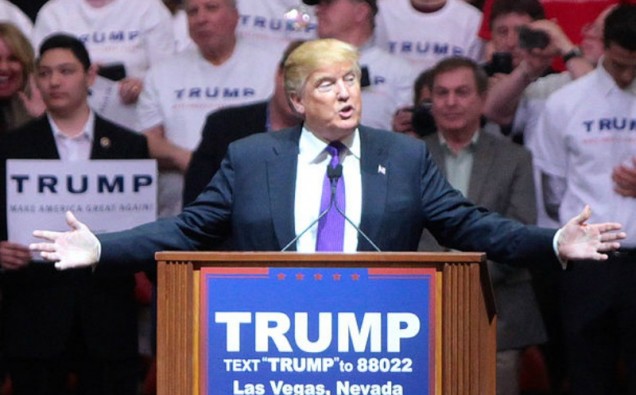
Donald Trump, who has declared himself as the presumptive Republican nominee after this week’s sweeping primary victories, Wednesday said as president he would work with Muslim allies to curb radicalization.
Unveiling his foreign policy priorities, the billionaire business tycoon, who had provoked a storm of criticism by proposing a “total ban” on Muslims entering the United States in the wake of militant attacks in Europe, also stressed that the US should stop” importing extremism through senseless immigration.”
The billionaire businessman, who leads his rivals with around 400 delegate numbers, punctuated his speech with a sharp criticism of the Obama Administration’s foreign policy and pledged to put America first if voted to the White House.
“My foreign policy will always put the interests of the American people, and American security, above all else. That will be the foundation of every decision that I will make,” he stated.
“America First will be the major and overriding theme of my administration.”
Trump, who has run an unconventional campaign with attacks against longtime American allies, said he would work “closely” with Muslim allies to contain radicalization.
Zalmay Khalilzad, the American Muslim to have served in the highest diplomatic position as US Permanent Representative to the UN, and ambassador to Afghanistan and Iraq, introduced Trump at the event.
In recent weeks, Trump has tried to build a diversity coalition of representatives from American communities.
Still, Trump used words “radical Islam”- an affront to Muslims, interfaith leaders and objective analysts – in his speech at the Center for National Interest, when he advocated the need for a “long-term plan to halt the spread and reach of radical Islam.”
Democratic leaders including frontrunner Hillary Clinton and the President Barack Obama have avoided linking Islam to radicalization.
“Containing the spread of radical Islam must be a major foreign policy goal of the United States,” Trump said.
Explaining his emphasis, Trump suggested that “events may require the use of military force. But it’s also a philosophical struggle, like our long struggle in the Cold War.”
Here are some of the comments, Trump made on the issue:
“In this we’re going to be working very closely with our allies in the Muslim world, all of which are at risk from radical Islamic violence.
“We should work together with any nation in the region that is threatened by the rise of radical Islam. But this has to be a two-way street – they must also be good to us and remember us and all we are doing for them.
“The struggle against radical Islam also takes place in our homeland. There are scores of recent migrants inside our borders charged with terrorism. For every case known to the public, there are dozens more.
“We must stop importing extremism through senseless immigration policies.”
Continuing, he believed that a “pause for reassessment will help us to prevent the next San Bernardino or worse — all you have to do is look at the World Trade Center and September 11th.”
Regarding the challenge to combat ISIS terror group, Trump said it was able to emerge due to the last few years policies.
“I have a simple message for them. Their days are numbered. I won’t tell them where and I won’t tell them how. We must as, a nation, be more unpredictable. But they’re going to be gone. And soon.”
He listed rebuilding American military and economy as the next great priority.
“Our military is depleted, and we’re asking our generals and military leaders to worry about global warming.
“We will spend what we need to rebuild our military. It is the cheapest investment we can make. We will develop, build and purchase the best equipment known to mankind. Our military dominance must be unquestioned.”
On the economic side, Trump said he would “change our trade, immigration and economic policies to make our economy strong again – and to put Americans first again. This will ensure that our own workers, right here in America, get the jobs and higher pay that will grow our tax revenue and increase our economic might as a nation.”
Trump said the American foreign policy must be based on American interests.
“In the Middle East, our goals must be to defeat terrorists and promote regional stability, not radical change. We need to be clear-sighted about the groups that will never be anything other than enemies.
“And we must only be generous to those that prove they are our friends.”
Touching on US relations with major powers, he said desired to “live peacefully and in friendship with Russia and China. We have serious differences with these two nations, and must regard them with open eyes. But we are not bound to be adversaries. We should seek common ground based on shared interests. Russia, for instance, has also seen the horror of Islamic terrorism.”
The remarks on Russia are likely to draw criticism from America’s European allies.
He also declared his intent to “look for talented experts with new approaches, and practical ideas, rather than surrounding myself with those who have perfect resumes but very little to brag about except responsibility for a long history of failed policies and continued losses at war.”
“Finally, I will work with our allies to reinvigorate Western values and institutions. Instead of trying to spread “universal values” that not everyone shares, we should understand that strengthening and promoting Western civilization and its accomplishments will do more to inspire positive reforms around the world than military interventions.”
America will continually play the role of peacemaker, Trump said.
“We will always help to save lives and, indeed, humanity itself. But to play that role, we must make America strong again. We must make America respected again. And we must make America great again.”












